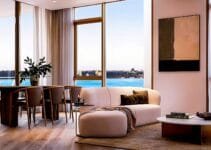Introduction to Contemporary Apartment Design
Contemporary apartment design embodies a philosophy that prioritizes both simplicity and functionality, reflecting the evolving tastes and lifestyles of modern individuals. This design approach accentuates clean lines, minimalistic aesthetics, and open spaces that promote a sense of relaxation and utility. It is characterized by its emphasis on neutral color palettes, natural textures, and the strategic use of light to enhance the living environment.
The purpose of this blog post is to introduce readers to an array of inspiring ideas from our ongoing video series, which showcases various elements of contemporary design. In the 21st part of this series, we delve into elegant yet uncomplicated design concepts that resonate with homeowners and aspiring decorators. Rather than overwhelming spaces with ornate decorations, contemporary design encourages a curated selection of furniture and decor that adds character without clutter.

Homeowners seeking to refresh their spaces would benefit from understanding how these principles manifest in real-world examples. The contemporary aesthetic draws inspiration from a variety of design movements, blending practicality with a touch of sophistication. By highlighting the best practices in apartment design, our blog aims to equip viewers with the knowledge needed to create personal sanctuaries that reflect their unique styles while remaining relevant in today’s fast-paced world.
Please read our article watch the newly uploaded video from our YouTube channel:
“Grig Stamate – Interior Design Solutions”
https://www.youtube.com/@GrigStamate
40 New Apartment Design Ideas, Elegance in Simplicity, #21 (video)
Here, you can see other related videos from our channel:
40 New Apartment Design Ideas, Elegance in Simplicity, #20 (video)
40 New Apartment Design Ideas, Elegance in Simplicity, #19 (video)
This installment in our series serves as a guide for those who wish to embrace the ideals of modern living. Through the exploration of contemporary design principles, readers will discover how simplicity can lead to stunning results, encouraging them to think critically about the choices made within their own living spaces. The journey of redesigning an apartment begins with a clear understanding of these foundational concepts, setting the stage for a harmonious environment.
Key Design Principles for Modern Living Spaces
Contemporary design transcends mere aesthetics; it encapsulates a philosophy that emphasizes simplicity, balance, and functionality in crafting modern living spaces. One of the paramount principles in this framework is minimalism. This approach focuses on the idea that less is more, advocating for an uncluttered and streamlined environment. By stripping away unnecessary elements and emphasizing essential furnishings, minimalism allows for a calming atmosphere that promotes mental clarity and relaxation. The careful selection of furnishings and decorations enhances not only visual appeal but also the transformative quality of space, making it conducive to everyday living.
Another crucial principle is balance, which refers to the distribution of visual weight within a space. Achieving balance can be accomplished through symmetrical arrangements, employing a mix of textures and materials, or utilizing color schemes that harmonously blend. By focusing on balance, designers ensure that no single aspect of the room overwhelms another, creating an inviting and well-proportioned environment. This accessibility fosters a connection between occupants and their surroundings, making the space feel cohesive and thoughtfully curated.
Functionality also plays an integral role in modern design. In today’s fast-paced lifestyle, living spaces must serve multiple purposes. Designers are increasingly tasked with creating versatile areas that can adapt to various needs—from cozy retreats to vibrant social hubs. Smart storage solutions, flexible furniture arrangements, and multi-use spaces empower individuals to tailor their environments to their personal requirements. By emphasizing these key design principles—minimalism, balance, and functionality—contemporary living spaces become not only elegant but also sustainable and user-centric, ensuring they meet the demands of modern life.
Highlighting Color Palettes for 2023
In the world of contemporary apartment design, color plays a pivotal role in shaping the overall aesthetic and atmosphere of the space. For the year 2023, several color palettes have emerged as trends that not only reflect current design sensibilities but also evoke specific moods conducive to modern living environments. Soft neutrals have gained immense popularity for their versatility and calming effect. Shades of beige, taupe, and warm grays can create a serene backdrop that enhances the natural light in an apartment while remaining timelessly elegant.
Alongside these soft hues, designers are increasingly incorporating bold accents to provide a striking contrast. Deep greens, vibrant blues, and ochre yellows uplift spaces, injecting energy and personality. Such bold highlights can be implemented through statement furniture, decorative elements, or feature walls, allowing residents to express their individuality without overwhelming the space. The balance between soft neutrals and bold colors can essentially reflect a homeowner’s style while creating an inviting and dynamic atmosphere.
Incorporating these color palettes into apartment design can be achieved through thoughtful application. For instance, painting one wall in a bold shade while keeping the surrounding walls neutral can create a focal point that draws the eye and adds depth to the room. Textiles, such as cushions and throws, can introduce additional splashes of color, harmonizing with the dominant palette. Additionally, artwork can further enhance the color scheme, bridging the gap between furnishings and wall treatments. Consideration should be given not only to personal preferences but also to the psychological effects of color; for instance, greens and blues are calming, while yellows and reds can evoke vibrancy and enthusiasm. By blending neutrals with striking accents, contemporary apartments can achieve a balance that is both elegant and inspiring.
Innovative Furniture Arrangements
When it comes to apartment design, the arrangement of furniture plays a pivotal role in maximizing limited space while maintaining an air of elegance. Innovative furniture arrangements can transform a small living area into a multifaceted environment that showcases both functionality and style. One popular approach is the use of multifunctional furniture, which serves dual purposes without sacrificing aesthetics. For example, a sleek coffee table that converts into a dining table can effortlessly adapt to various social settings while saving valuable floor space.
In small apartments, layout strategies can significantly enhance both flow and functionality. Employing a layout that prioritizes open spaces can make even the coziest of apartments feel larger. Consider placing furniture pieces against the walls, which opens up the central area for movement. This tactic not only creates a more inviting atmosphere but also allows natural light to permeate the space. Additionally, incorporating furniture on legs rather than bulky designs can provide visual accessibility, further contributing to a sense of openness.
Another key element to consider is the arrangement of seating. Grouping chairs and sofas in a circular layout can facilitate conversation while making the space feel inviting. Additionally, utilizing area rugs can define different zones within the room, allowing each section to serve its unique purpose without overwhelming the design. Furthermore, incorporating vertical storage solutions, such as floating shelves, can help declutter surfaces while enhancing the overall elegance of the apartment.
Maximizing space in an apartment requires creativity and thoughtful planning. By implementing innovative furniture arrangements that emphasize multifunctionality and open layouts, one can achieve an equilibrium of style and practicality. This not only enhances the living experience but also reflects a sophisticated approach to contemporary apartment living.
Incorporating Natural Elements
In contemporary apartment design, the integration of natural elements has become increasingly significant. This approach not only enhances the aesthetic appeal of living spaces but also contributes to emotional well-being and tranquility. By incorporating elements such as wood, plants, and stones, interiors can achieve a harmonious connection with the surrounding environment, fostering a sense of balance and serenity.
Wood is a versatile material that adds warmth and texture to modern designs. Its natural grains and rich tones can evoke feelings of comfort, making spaces feel more inviting. Whether it is used in flooring, furniture, or decorative accents, wooden elements play a crucial role in creating a cozy atmosphere. The choice of reclaimed wood can further amplify this effect, promoting sustainability while delivering an authentic rustic charm that resonates with many homeowners.
Another essential aspect of incorporating natural elements is the use of plants. Indoor greenery not only beautifies the space but also improves air quality and adds a refreshing ambiance. From large potted floor plants to smaller succulent arrangements, various types of vegetation can be strategically placed to enhance visual appeal without overwhelming the decor. Additionally, the act of taking care of plants can cultivate mindfulness, making the living environment more enriching.
Stones and natural rock formations can also be utilized effectively in interior design. Textured stone walls or countertops introduce a raw, earthy quality that complements other natural materials. This creates a balance between elegance and simplicity, aligning well with modern design principles. Furthermore, the incorporation of natural elements has been shown to reduce stress and promote relaxation, making these design choices not just aesthetic but also essential for enhancing the quality of life within the apartment.
Lighting as a Design Element
Lighting is an essential component in apartment design, serving not only functional purposes but also significantly influencing the aesthetic appeal of a space. The effective implementation of different lighting types—ambient, task, and accent—can elevate the elegance of any room, enhancing both its practicality and visual charm.
Ambient lighting, often considered the foundational layer, establishes the overall illumination of a space. It can be achieved through ceiling fixtures, wall sconces, or even natural light sources such as windows. The choice of ambient light fixtures should complement the design style, ensuring a cohesive look throughout the apartment. Warm, soft lighting tends to create a cozy atmosphere, which is particularly well-suited for living areas and bedrooms, while brighter, cooler tones can contribute to a more dynamic and energetic environment in spaces like kitchens and home offices.
Task lighting, the second layer, is crucial for illuminating specific areas where activities such as reading, cooking, or working take place. This type of lighting can include table lamps, under-cabinet lights in the kitchen, and adjustable pendant lights over work surfaces. Careful placement of task lighting can enhance functionality by reducing shadows and providing adequate brightness where needed. It is important to consider the intensity and color of the task lighting to ensure it aligns with the overall ambiance of the apartment.
Finally, accent lighting serves as a highlight, drawing attention to particular features or areas within an apartment, such as artwork, architectural details, or plants. This type of lighting can create dramatic effects and add depth to the space, making it feel more layered and inviting. The strategic use of spotlights, wall washers, or LED strips can bring these elements to life, contributing to the sophistication of the apartment design.
In conclusion, understanding the interplay between ambient, task, and accent lighting is vital for enhancing the elegance and functionality of an apartment. Thoughtful lighting choices can transform average spaces, creating inviting and well-balanced environments that reflect the personality of the residents.
Stylish Storage Solutions
Maintaining a clutter-free environment is essential for both functionality and aesthetics in modern apartment design. Stylish storage solutions can significantly enhance the organization of your living space while ensuring that practicality does not compromise style. One effective approach is the integration of storage units within existing furniture. For instance, utilizing ottomans with hidden compartments or beds with built-in drawers allows residents to neatly store items without detracting from the room’s overall elegance.
Another innovative strategy involves the creative use of vertical space. In smaller apartments, every square foot counts, and maximizing vertical areas can help in achieving an organized layout. Wall-mounted shelves are not only functional but can also serve as decorative elements. By displaying books, plants, or art, these shelves elevate the décor while providing storage. Consider pegboards or hanging organizers in kitchens and home offices, which can keep items easily accessible while utilizing the wall space effectively.
Additionally, bespoke cabinetry tailored to specific needs can enhance both aesthetics and storage capacity. Built-in units designed to blend seamlessly with the walls or other furniture can serve as stylish bookcases, media centers, or pantry spaces while saving valuable floor area. Multi-functional furniture, such as coffee tables with drawers or console tables with shelving, can also help in maintaining an organized environment.
To keep essentials organized without compromising on style, utilizing decorative boxes or baskets can harmonize utility with design. Grouping similar items together in visually appealing containers not only ensures ease of access but also maintains an orderly appearance. By implementing these stylish storage solutions, one can achieve a clean and sophisticated living space, balancing functionality with the elegance that modern apartment living demands.
Personalizing Your Space: Art and Decor Ideas
Creating a sense of home in an apartment often involves the thoughtful integration of art and decor. Personal touches not only reflect individual taste but also enhance the overall design of a living space, allowing residents to feel more connected to their surroundings. When selecting artwork, it is essential to consider how these pieces align with the apartment’s theme. A cohesive approach, where art complements the color palette and furnishings, can contribute significantly to a harmonious environment.
One effective strategy for personalizing your apartment is to choose art pieces that resonate with your interests and experiences. For instance, photographs from memorable trips or local artists’ works can add a narrative layer to your decor, telling a story that visitors can engage with. Additionally, while large statement pieces can act as focal points, smaller artworks can be grouped to create dynamic gallery walls. This approach not only showcases personal preferences but also allows for diversity in style and form.
Incorporating personal mementos lends authenticity to your decor. Items collected from various aspects of life—such as souvenirs, heirlooms, or crafts—can be creatively displayed alongside contemporary art. This juxtaposition of styles can lead to unique, visually intriguing arrangements that breathe life into an otherwise minimalist design. Shelves, mantels, or even wall-mounted arrangements can serve as platforms for these cherished items while maintaining an elegant aesthetic.
Moreover, it is important to remain mindful of space constraints in apartments. Choosing decor that is proportional to the room size enhances both functionality and appearance. Opt for multi-functional decor pieces, such as decorative boxes or stylish storage solutions, which serve dual purposes while contributing to the overall design. By intentionally selecting art and decor that aligns with the apartment’s theme and reflects personal stories, residents can achieve a space that feels not only elegant but distinctly their own.
Conclusion: The Future of Apartment Design
As we reflect on the evolution of apartment design, it becomes evident that the interplay between elegance and simplicity has defined architectural trends for decades. Historically, apartment designs have transitioned from elaborate, ornate styles to more streamlined, minimalistic aesthetics. This shift illustrates a broader societal movement towards functionality, sustainability, and conscious living within urban environments. Contemporary designs often emphasize clean lines, open layouts, and natural materials, allowing residents to experience a serene and uncluttered lifestyle.
Looking forward, the future of apartment design seems poised for further innovation, driven by advancements in technology and an increasing emphasis on sustainability. Smart home features, energy-efficient appliances, and eco-friendly building materials will likely become standard in modern apartments. Additionally, the trend towards multifunctional spaces—where a single area serves multiple purposes—aligns well with urban dwellers’ needs for adaptability and efficiency. This focus on versatility not only maximizes space but also embraces the principles of minimalism, compelling homeowners to curate their belongings thoughtfully.
While future trends in apartment design will undoubtedly prioritize elegance and simplicity, it is crucial for individuals to embrace their personal style within these frameworks. The beauty of modern apartment design lies in its ability to be customized and personalized, enabling residents to create spaces that reflect their unique tastes and lifestyles. Whether incorporating vibrant accents, selecting bespoke furnishings, or experimenting with alternative layouts, individuals have the opportunity to enhance their living environments. By understanding and leveraging the balance between elegance and simplicity, one can take full advantage of the design innovations that the future holds.
Other related posts from our website:
Let’s see here, three of them:
https://howtobuildahouseblog.com/40-new-apartment-design-ideas-elegance-in-simplicity-20/
https://howtobuildahouseblog.com/time-traveler-2-tour-of-elegant-vintage-style-interiors/
https://howtobuildahouseblog.com/elegance-unveiled-stunning-modern-living-rooms-55-new-design-ideas/
Thank you so much for your attention.
We also sincerely hope you like our ideas from this post, and you have also enjoyed our uploaded YouTube video.
See you next time at another article.
Thank you so much for your time. Bye now!


